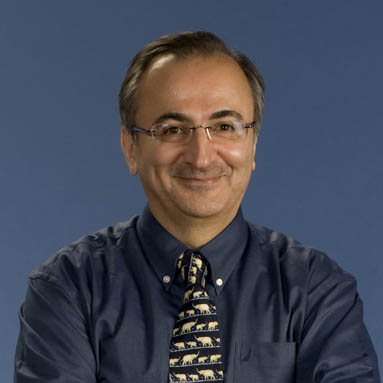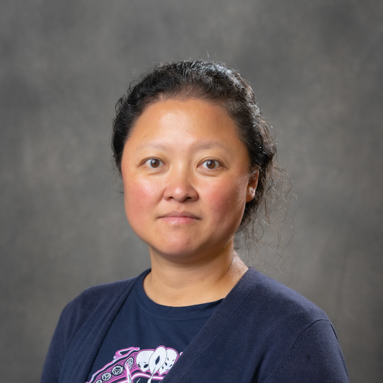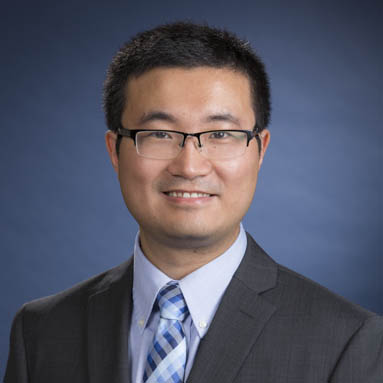Graduate students in WPI’s master's in mechanical engineering program don’t just ask “why,” they ask “why not?” If you’re a passionate innovator, builder, and problem solver, the collaborative and inspiring environment will help you tackle society’s most critical engineering challenges whether in research or industry.
The mechanical engineering graduate program receives significant funding, including support from such sources as the National Institutes of Health, NASA, the National Science Foundation, and Sandia National Labs.
Our world-class, dedicated faculty members invite MS in mechanical engineering students into their research projects in our various cutting-edge labs. And in our classrooms, you’ll gain a depth and breadth of understanding mechanical engineering practices to assume leadership roles in the industry. Whatever your goals are in our mechanical engineering degree program, our faculty will push you to forge your path and realize your ambitions.

This program is also available online
Learn moreCurriculum
The course work for our mechanical engineering master's degree will include mechanical engineering, mathematics, electives, and a graduate seminar. You may choose to complete a thesis or non-thesis option, the latter requiring more courses in mechanical engineering to replace the thesis requirements.
MS in Mechanical Engineering graduate students may choose from five fields of study to allow the most opportunity to work on current research with WPI faculty. These diverse areas of study include the following:
- Biomechanical engineering
- Dynamics and controls
- Manufacturing and design
- Structures and materials
- Thermal and fluid sciences (fluids engineering)
Advance Car Parking: Car Games
Research for the Master’s Degree in Mechanical Engineering
The diverse research activities within WPI’s master's in mechanical engineering program place graduate students at the center of research that’s advancing key 21st century industries.
Companies that work with WPI’s faculty (and our mechanical engineering master's students):
- NASA
- Massachusetts Eye and Ear Infirmary
- Orthocare Innovations
- Bose Corporation

Well-equipped facilities and accessible research labs let you focus on your research at hand.

Whether your interests lean toward structures and materials or toward fluids and thermal engineering, WPI’s mechanical engineering graduate program allows you to shape your studies according to your career goals.

Faculty in WPI’s mechanical engineering department pursue research in areas that are varied, but all have an important impact on humanity.

Mechanical engineering includes studies in areas including aerospace and materials science.

Research possibilities include collaborations with local industries working on immediate healthcare needs or with NASA on future space exploration and technology.

Students and faculty work collaboratively on well-funded research projects, opening up valuable opportunities and possibilities for internships, collaborations, and potential employment.

Well-equipped facilities and accessible research labs let you focus on your research at hand.

Whether your interests lean toward structures and materials or toward fluids and thermal engineering, WPI’s mechanical engineering graduate program allows you to shape your studies according to your career goals.

Faculty in WPI’s mechanical engineering department pursue research in areas that are varied, but all have an important impact on humanity.

Mechanical engineering includes studies in areas including aerospace and materials science.

Research possibilities include collaborations with local industries working on immediate healthcare needs or with NASA on future space exploration and technology.

Students and faculty work collaboratively on well-funded research projects, opening up valuable opportunities and possibilities for internships, collaborations, and potential employment.

Well-equipped facilities and accessible research labs let you focus on your research at hand.
Research Facilities
Our comprehensive facilities offer an open and collaborative environment where you’ll work on new discoveries with engineers from across disciplines. We offer five centers and more than 20 research laboratories run by renowned faculty, supported by industry partners, and outfitted with innovative equipment and instruments.
Graduate Studies Series.
Team members from Graduate & Professional Studies host quick and convenient webinars designed to highlight popular topics when starting grad school. Take a deep dive into specific areas of interest such as how to secure funding, how to ace your application, an overview of student services, and more!
Faculty Profiles


I enjoy teaching at the undergraduate and graduate levels. Teaching is very rewarding, and it allows me to interact with the students. My teaching portfolio includes undergraduate and graduate level courses in the areas of heat transfer, fluid mechanics, liquid/vapor phase change, thermodynamics, and design of thermal systems.

Autonomous vehicles – aircraft, cars, rovers, over- and underwater vehicles that can move in the real world by themselves without human pilotage – have gained immense importance not only due to the broad spectrum of their potential military and civilian applications, but also due to the concurrent development of sensor technology and embedded systems that enable the realization of true autonomy.
Professor Fischer is the William Smith Dean's Professor and a faculty member in Robotics Engineering with a appointments in Mechanical Engineering and Biomedical Engineering at WPI. He received his PhD in Mechanical Engineering in 2008 from Johns Hopkins University, where he was part of the NSF Engineering Research Center for Computer Integrated Surgery. At WPI he has been an integral part of developing the Robotics Engineering program and teaches primarily junior-level and graduate courses in Robotics.

My research is aimed towards understanding fundamental aspects of reacting flows at thermodynamic conditions of relevance to aircraft, rocket, and automobile propulsion. Reacting flow phenomena occurring in engines are complicated as a result of turbulent flow, interaction with solid boundaries, and extreme thermodynamic conditions. In order to understand and simulate combustion phenomena under such conditions, there is a necessity to develop accurate chemical kinetic and molecular transport models in addition to fluid mechanics models.

My research bridges the gap between human-robot interaction and human movement science. I am particularly interested in the design of human-robot interfaces and assistive robot autonomy, based on the understanding of the perception-action coupling of humans and cyber-human systems. At WPI, I primarily work on tele-nursing robots and assisted teleoperation interfaces. I also have extensive experience in exoskeletons for rehabilitation and tele-surgical robots.

The overarching theme of my research is light-matter interactions and their applications in microscale and nanoscale. Particularly, my research interests include optical trapping, optofluidics, nanophotonics, cavity optomechanics, and fiber optic sensing systems, with an emphasis on optical actuation, damping, and sensing of mechanics in micro-/nano-scale structures and biological specimens. The potential applications of my research include on-chip disease diagnosis, in vivo disease treatments, motion detection in consumer electronics, health monitoring, and biomechanics.

Dr. Panchapakesan is the director of the Small Systems Laboratory (SSL) which is dedicated to the development of multi-functional materials, devices and systems at the macro-, micro-, meso- and nanoscales. Our work spans in multiple areas bridging multiple disciplines and multiple length scales. Facilities at SSL include fabrication and characterization units for advanced materials, device processing and testing and biomaterials characterization. Access to the clean room facilities around the Boston area adds to the excitement of student learning as well as experimentation.


I enjoy teaching at the undergraduate and graduate levels. Teaching is very rewarding, and it allows me to interact with the students. My teaching portfolio includes undergraduate and graduate level courses in the areas of heat transfer, fluid mechanics, liquid/vapor phase change, thermodynamics, and design of thermal systems.

Autonomous vehicles – aircraft, cars, rovers, over- and underwater vehicles that can move in the real world by themselves without human pilotage – have gained immense importance not only due to the broad spectrum of their potential military and civilian applications, but also due to the concurrent development of sensor technology and embedded systems that enable the realization of true autonomy.
Professor Fischer is the William Smith Dean's Professor and a faculty member in Robotics Engineering with a appointments in Mechanical Engineering and Biomedical Engineering at WPI. He received his PhD in Mechanical Engineering in 2008 from Johns Hopkins University, where he was part of the NSF Engineering Research Center for Computer Integrated Surgery. At WPI he has been an integral part of developing the Robotics Engineering program and teaches primarily junior-level and graduate courses in Robotics.

My research is aimed towards understanding fundamental aspects of reacting flows at thermodynamic conditions of relevance to aircraft, rocket, and automobile propulsion. Reacting flow phenomena occurring in engines are complicated as a result of turbulent flow, interaction with solid boundaries, and extreme thermodynamic conditions. In order to understand and simulate combustion phenomena under such conditions, there is a necessity to develop accurate chemical kinetic and molecular transport models in addition to fluid mechanics models.

My research bridges the gap between human-robot interaction and human movement science. I am particularly interested in the design of human-robot interfaces and assistive robot autonomy, based on the understanding of the perception-action coupling of humans and cyber-human systems. At WPI, I primarily work on tele-nursing robots and assisted teleoperation interfaces. I also have extensive experience in exoskeletons for rehabilitation and tele-surgical robots.

The overarching theme of my research is light-matter interactions and their applications in microscale and nanoscale. Particularly, my research interests include optical trapping, optofluidics, nanophotonics, cavity optomechanics, and fiber optic sensing systems, with an emphasis on optical actuation, damping, and sensing of mechanics in micro-/nano-scale structures and biological specimens. The potential applications of my research include on-chip disease diagnosis, in vivo disease treatments, motion detection in consumer electronics, health monitoring, and biomechanics.

Dr. Panchapakesan is the director of the Small Systems Laboratory (SSL) which is dedicated to the development of multi-functional materials, devices and systems at the macro-, micro-, meso- and nanoscales. Our work spans in multiple areas bridging multiple disciplines and multiple length scales. Facilities at SSL include fabrication and characterization units for advanced materials, device processing and testing and biomaterials characterization. Access to the clean room facilities around the Boston area adds to the excitement of student learning as well as experimentation.

Have questions?
WPI's dedicated graduate student support team can help.
Refer a Friend
Do you have a friend, colleague, or family member who might be interested in a WPI graduate program? Click below to tell them about our programs.
Ready to Pursue Your Mechanical Engineering Master’s Degree?
If you’re considering a mechanical engineering career, a master’s degree in mechanical engineering will help you start your career at well-known, global companies. Graduates are prepared for mechanical engineering jobs as aerospace engineers, manufacturing engineers, nuclear engineers, and many more. If you’re interested in working alongside other like-minded brains in a challenging and rewarding environment, explore our MS in mechanical engineering WPI’s mechanical engineering department is the oldest and largest at WPI. Dedicated advisors help students find the challenging, yet rewarding roles in exciting mechanical engineering graduate jobs or in a graduate school path they’re seeking. What are you waiting for? Apply today.
Prefer to Pursue Your MS in Mechanical Engineering Online?
Do you want a mechanical engineering masters, but need flexibility to complete the degree? Check out WPI’s mechanical engineering master's online which provides the time to balance work, family, and academics.
Interested in Pursuing a PhD in Mechanical Engineering?
Our PhD in Mechanical Engineering enables students to gain a higher level of expertise in the fields and specialties where they are driven to discover more. WPI’s PhD in mechanical engineering program helps you forge your own path with pioneering research and alongside our renowned faculty members.
Elevate Your Leadership Skills with Our METL Graduate Certificate
Want to take your technical skills and your managerial skills to the next level? WPI’s Mechanical Engineering for Technical Learning (METL) Graduate Certificate Program will help you do exactly that so you can advance in your career. With a strong focus on leadership and management, this program enables mechanical engineers to accelerate in their field.
Need a Bachelor’s in Mechanical Engineering First?
Ready to explore a mechanical engineering path but need to get your bachelor’s degree before you move forward? Explore WPI’s BS in mechanical engineering which will provide the essential hands-on skills you need to succeed. Maybe you want to understand mechanical engineering principles to complement your major? A minor might be just what you need. Explore WPI’s mechanical engineering minor program.


